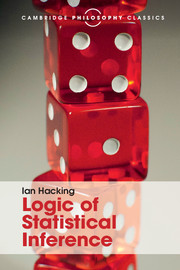Book contents
2 - The chance set-up
Published online by Cambridge University Press: 05 July 2016
Summary
Of what kind of thing is chance, or frequency in the long run, a property? Early writers may have conceived chances as properties of things like dice. Von Mises defines probability as the property of a sequence, while Neyman applies it to sets called fundamental probability sets. Fisher has an hypothetical infinite population in mind. But a more naïve answer stands out. The frequency in the long run of heads from a coin tossing device seems to be a property of the coin and device; the frequency in the long run of accidents on a stretch of highway seems to be a property of, in part, the road and those who drive upon it. We have no general name in English for this sort of thing. I shall use ‘chance set-up’. We also need a term corresponding to the toss of the coin and observing the outcome, and equally to the passage of a day on which an accident may occur. For three centuries the word ‘trial’ has been used in this sense, and I shall adopt it.
A chance set-up is a device or part of the world on which might be conducted one or more trials, experiments, or observations; each trial must have a unique result which is a member of a class of possible results.
A piece of radium together with a recording mechanism might constitute a chance set-up. One possible trial consists in observing whether or not the radium emits radiation in a small time interval. Possible results are ‘radiation’ and ‘none’. A pair of mice may provide a chance set-up, the trial being mating and the possible results the possible genetic make-ups of the offspring. The notion of a chance set-up is as old as the study of frequency. For Cournot, frequencies are properties of parts of the world, though he is careful not to say exactly what parts, in general. Venn's descriptions make it plain that he has a chance set-up in mind, and that it is this which leads him to the idea of an unending series of trials. Von Mises’ probability is a property of a series, but it is intended as a model of a property of what he calls an experimental set-up—I have copied the very word ‘set-up’ from his English translators.
Information
- Type
- Chapter
- Information
- Logic of Statistical Inference , pp. 12 - 24Publisher: Cambridge University PressPrint publication year: 2016
Accessibility standard: Unknown
Why this information is here
This section outlines the accessibility features of this content - including support for screen readers, full keyboard navigation and high-contrast display options. This may not be relevant for you.Accessibility Information
- 1
- Cited by
